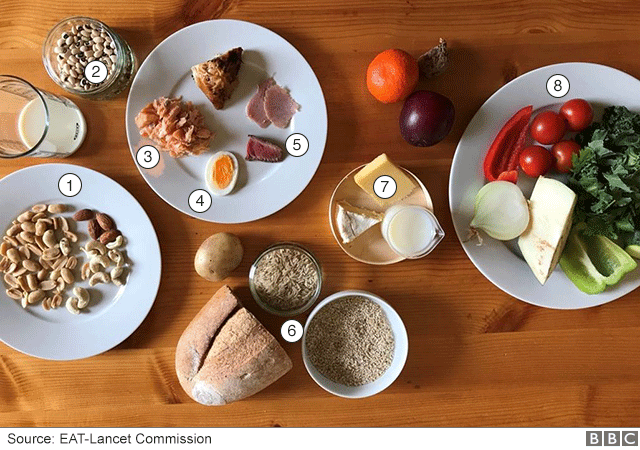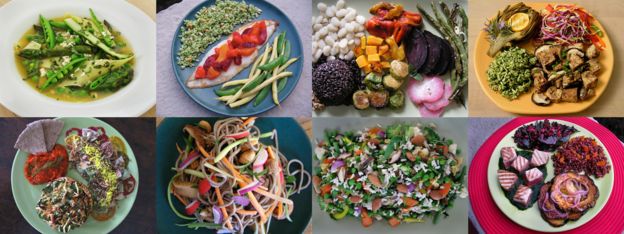A diet has been developed that promises to save lives, feed 10 billion people and all without causing catastrophic damage to the planet.
Scientists have been trying to figure out how we are going to feed billions more people in the decades to come.
Their answer - "the planetary health diet" - does not completely banish meat and dairy.
But it is recommending we get most of our protein from nuts and legumes (such as beans and lentils) instead.
Their diet needs an enormous shift in what we pile on to our plates and for us to turn to foods that we barely eat.
What changes am I going to have to make?
If you eat meat every day then this is the first biggie. For red meat you're looking at a burger a week or a large steak a month and that's your lot.
You can still have a couple of portions of fish and the same of chicken a week, but plants are where the rest of your protein will need to come from. The researchers are recommending nuts and a good helping of legumes every day instead.
There's also a major push on all fruit and veg, which should make up half of every plate of food we eat.
Although there's a cull on "starchy vegetables" such as the humble potato or cassava which is widely eaten in Africa.
So what is the diet in detail?
If you served it all up this is what you would be allowed each day:

- Nuts - 50g a day
- Beans, chickpeas, lentils and other legumes - 75g a day
- Fish - 28g a day
- Eggs - 13g a day (so one and a bit a week)
- Meat - 14g a day of red meat and 29g a day of chicken
- Carbs - whole grains like bread and rice 232g a day and 50g a day of starchy vegetables
- Dairy - 250g - the equivalent of one glass of milk
- Vegetables -(300g) and fruit (200g)
The diet has room for 31g of sugar and about 50g worth of oils like olive oil.
Will it taste awful?
Prof Walter Willet, one of the researchers who is based at Harvard, said no and that after a childhood on a farm eating three portions of red meat a day he was now pretty much in line with the planetary health diet.
"There's tremendous variety there," he said. "You can take those foods and put them together in thousands of different ways. We're not talking about a deprivation diet here, it is healthy eating that is flexible and enjoyable."

Image caption: These are some plates of food that meet the planetary health diet rulesIs this for real, or just a fantasy?
This plan requires changes to diets in pretty much every corner of the world.
Europe and North America need to cut back massively on red meat, East Asia needs to cut back on fish, Africa on starchy vegetables.
"Humanity has never attempted to change the food system at this scale and this speed," said Line Gordon, director of the Stockholm Resilience Centre, at Stockholm University.
"Whether it's a fantasy or not, a fantasy doesn't have to be bad... it's time to dream of a good world," she says.
Taxes on red meat are one of the many options the researchers say may be necessary to persuade us to switch diets.
Who came up with this?
A group of 37 scientists from around the world were brought together as part of the EAT-Lancet commission.
They're a mix of experts from farming to climate change to nutrition. They took two years to come up with their findings which have been published in the Lancet.
Why do we need a diet for 10 billion people?
The world population reached seven billion in 2011 and it's now around 7.7 billion. That figure is expected to reach 10 billion around 2050 and will keep on climbing.
Will it save lives?
The researchers say the diet will prevent about 11 million people dying each year.
That number is largely down to cutting diseases related to unhealthy diets such as heart attacks, strokes and some cancers. These are now the biggest killers in developed countries.
So will this diet save the planet?
The researchers' aim was to feed more people while:
- minimising greenhouse gas emissions
- preventing any species going extinct
- having no expansion of farmland, and
- preserving water
However, just changing diets is nowhere near enough.
To make the numbers add up, also requires a halving of food waste and an increase in the amount of food produced on current farmland.
Why isn't meat being banned?
"If we were just minimising greenhouse gases we'd say everyone be vegan," said Prof Willet.
However, it was unclear whether a vegan diet was the healthiest option, he said.
So what happens now?
The EAT-Lancet Commission is going to take its findings to governments around the world and bodies such as the WHO to see if it can begin to change the way we eat.
Latest Stories
-
Ghana and Seychelles sign two agreements
2 mins -
GEPA calls for simplified digital systems to enhance cross-border trade
4 mins -
Akufo-Addo calls on Otumfuo as he commends Asanteman for the support
4 mins -
Akufo-Addo inaugurates reconstructed Atafoa bridge
6 mins -
‘We’ll do better than 2020’ – Sammi Awuku predicts NPP votes surge in 2024
17 mins -
Ghana-Diaspora Home Purchase Expo 2024 set to take off
20 mins -
2024 elections is a choice between the future and the past, says Sammi Awuku
24 mins -
Thousands of Christians pray for Bawumia at Hebron Prayer Camp
37 mins -
Bawumia taunts Mahama for his poor housing record as he commissions 1,000 TDC houses
46 mins -
Election 2024: Key Highlights of National Election Security Taskforce meeting with EC held on November 26, 2024
1 hour -
‘Flawed from the start’ – Martin Amidu dismisses Supreme Court ruling backing Majority Leader
2 hours -
Afenyo-Markin’s bended knees recall plea insulting to electorate, waste of public funds – Martin Amidu
3 hours -
Martin Amidu: The majority leader’s memorandum to recall Parliament is needless now
3 hours -
Parliamentary disruption is a self-inflicted wound – Speaker’s lawyer criticises Supreme Court plaintiff’s actions
3 hours -
Seeds are more expensive than gold – Netherlands Ambassador calls for collective action on Agrobiodiversity
4 hours

